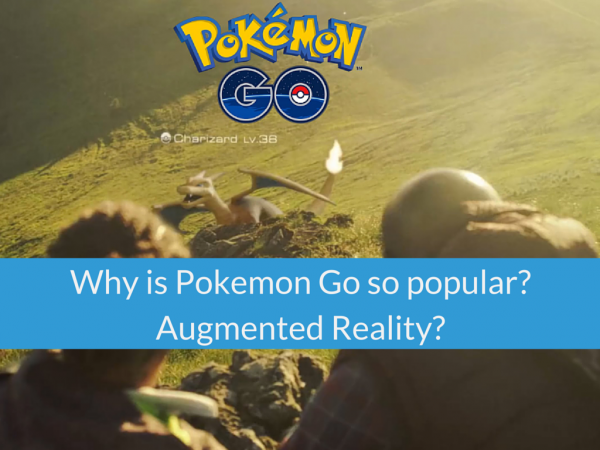
Pokémon Go has taken the world by storm. Right now, millions of people are playing Pokémon Go and trying to catch them all. The first breakthrough that the app made is to beat Tinder in total apps installation. It also beat Twitter based on the total number of active users per day. In addition, the average use time of the app is more than 40 minutes, which is more than WhatsApp, and other social media apps.
The success is so astounding that individual developers have already started developing tools around Pokémon Go. Jpain, a developer at Ve Interactive, is currently working on Pokémon Go API’s. Catch him live by following his channel here.
So, what makes Pokémon Go so popular? Is there any particular reason behind its grand success? Is it the augmented reality? Let’s try to find the answers.
Augmented Reality
Pokémon Go is the first augmented reality game with grand success. Niantic, the developer of the game, is undoubtedly enjoying the success. But, does it take ideas from other augmented reality applications? The answer is, yes. It borrows heavily from Ingress, another game from Niantic released way back in 2013. The two games are closely related to the core — the easier one being, Pokémon.
So, what is the role of augmented reality in the popularity of Pokémon Go? A lot. People love AR more than VR as it gives them the freedom to move around freely. Also, AR games are unique and new for many players due to its novelty. But, it is not the sole factor. There are earlier augmented reality games and there will be others in the future, but it is hard to predict whether or not the future games can match the popularity of Pokémon Go.
Pokémon Brand
The number one reason for Pokémon Go’s success is Pokémon itself. Satoshi Tajiri created Pokémon in 1995. It made a huge success with the release of video games and related TV series. Its popularity also made many social scientists interested in Pokémon, wanting to know why people loved to watch or collect virtual things.
The new release of Pokémon Go, further aroused their interest in the idea of the virtual collection, and gives researchers a new way to look at the available data.
Feelgood Factor
Games have been using the feelgood factor for over a decade. The reward, functionality of our brain, is also triggered even though there is no tangible benefit in the real world. When we feel awarded, our brain releases the feel good hormone, Dopamine.
Repeated experiences can lead an individual to create a habit. Pokémon Go brings in tons of feelgood factor. Mix the popularity of the virtual characters with the idea of “Catch them all,” and the player can have a great journey to becoming the Pokémon Master.
Exercise
Just like playing games, exercise also helps us to feel good. It promotes proper circulation of blood and helps elevate mood. Furthermore, it also improves your day-to-day activities. And, when you mix game mechanics with a lot of walking/exercise, you are virtually getting double the fun out of a single app.
Adventure
People love adventure. Pokémon Go gives everyone the opportunity to engage with their environment, and virtually go on an adventure. Tom Currie, a 24-year-old man from New Zealand, quit his job to play Pokémon Go full-time. He’s not the only one. Many people are “bunking” classes and work to play the game. But, these are unique cases, not everyone has to be so extreme to enjoy the game.
For many players, the adrenaline rush is a novelty. You will never know where you are moving next to find the next Dragonite. The game uses landmarks to its advantage, and pushes the player to go to different locations for the search of a new Pokémon. For example, the player needs to move closer to a body of water to be able to find a water-type Pokémon.
Also, he will not be able to find every Pokémon in a single country, and might have to travel abroad to “catch them all.” A genuine sense of adventure really makes the game a treat for everyone, even when not a fan of Pokémon.
Social interactivity
Social Interactivity is imbued within human’s genes. We love to interact with people and share our stories with others. With Pokémon Go, social interactivity just becomes easier. Now, players can easily communicate with strangers.
With Pokémon Go, the player doesn’t need to ask any question to start the conversation. Players can just walk up to anyone and share their stories. They can also showcase their collection to friends, family, and peers! A win-win situation for players who love to do social interaction.

Digital Collection
One last reason behind Pokémon Go’s popularity is due to the collectibles. Every Pokémon Go trainer has to collect them all to become the ultimate collector (the end goal). With the digital era, it is common for people to collect digital paraphernalia and enjoy them, contributing to the popularity of the app.
Conclusion
As you can see, Pokémon Go has surely taken the world by storm, and there are multiple factors behind its global success. With its popularity, many questions related to security and law are popping up on social media. But that’s another story.
Are you a Pokémon Go player, too? If yes, share your experience of Pokémon Go in the comment section below.







